Revision Notes: The Supreme Court | History and Civics Class 10 ICSE PDF Download
| Table of contents |

|
| The Judiciary in India |

|
| Supreme Court |

|
| Jurisdiction and Powers of the Supreme Court |

|
| Functions of the Supreme Court |

|
The Judiciary in India
- India has a single judiciary system, which means there is one set of civil and criminal laws that applies to the entire country.
- The Supreme Court is the highest authority in the Indian judiciary, overseeing the functions of lower courts.
- Cases can be appealed from the High Court to the Supreme Court.
Need for a Single Independent Judiciary
- Independence: The judiciary must be independent and free from interference by the executive and legislative branches to protect individual rights.
- Federal Structure: An independent judiciary is essential for a federal system where powers are divided between the state and central governments.
- Protecting Democracy: Only an independent judiciary can safeguard democracy and protect the fundamental rights of citizens.
Supreme Court
- The Supreme Court is located in New Delhi and is the highest court of appeal in India.
- Composition: The Supreme Court consists of the Chief Justice of India and up to 25 other judges.
- Qualifications for Judges: To be appointed as a judge of the Supreme Court, a person must:
- Be a citizen of India.
- Have been a judge of a High Court for at least five years, or have served as a judge of two or more High Courts in succession.
- Be considered a distinguished jurist by the President of India.
Appointment of Supreme Court Judges
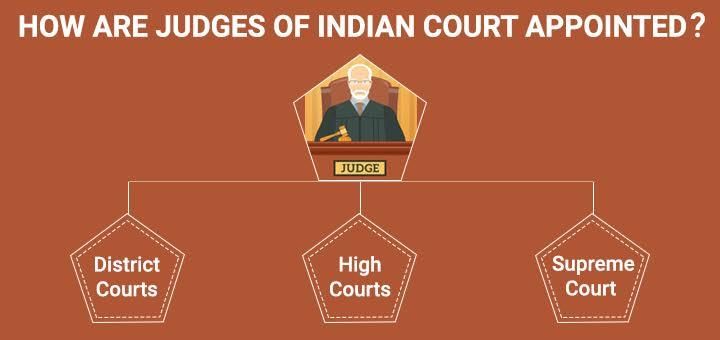
- By the President: The judges of the Supreme Court are appointed by the President of India.
- Consultation: The President makes these appointments in consultation with other judges of the Supreme Court, judges of the High Courts, and the Council of Ministers.
- Chief Justice: The senior-most judge of the Supreme Court is appointed as the Chief Justice of India.
Appointment of Ad Hoc Judges
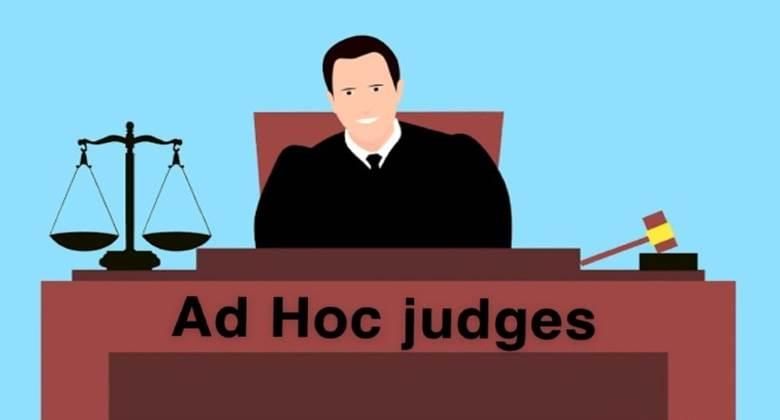
- Ad Hoc Judges: Judges from High Courts can be appointed as ad hoc judges of the Supreme Court when necessary.
- Chief Justice's Authority: The Chief Justice of India has the authority to appoint these ad hoc judges.
- Consultation: The appointment is made after consulting the President and with the consent of the Chief Justice of the concerned High Court.
Term of Office for Supreme Court Judges
- Age Limit: A judge of the Supreme Court holds office until they reach the age of 65 years.
- Resignation: A judge can resign by submitting a letter of resignation to the President.
- Removal: A judge can only be removed through impeachment for proven misbehavior or incapacity.
- Impeachment Process: Impeachment requires a two-thirds majority in both Houses of Parliament.
Salaries of Judges
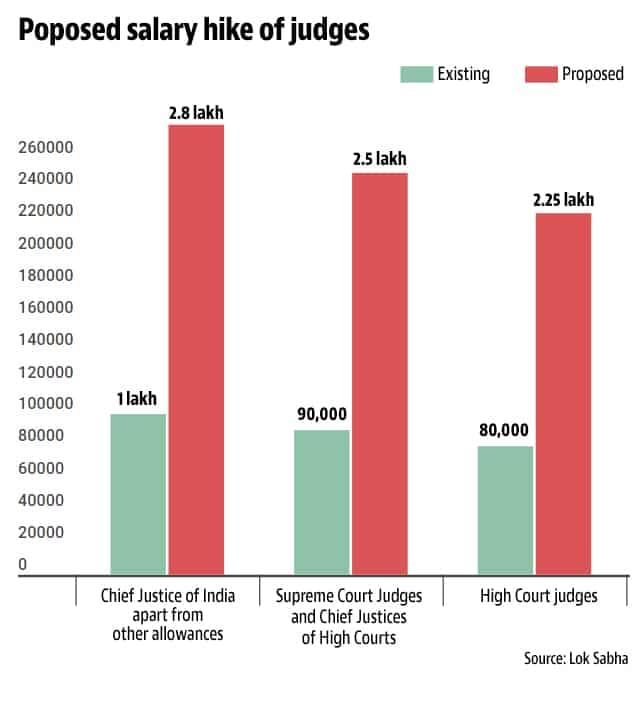
Judges of the Supreme Court receive their salaries from the Consolidated Fund of India. Their salaries and allowances cannot be voted on by Parliament. During their tenure, judges' salaries cannot be reduced, except during a financial emergency.
Independence of the Judiciary from the Executive and Legislature
The Constitution of India ensures the independence of the judiciary in several ways:
- Appointment of Judges: Judges of the Supreme Court are appointed by the President of India in consultation with the Prime Minister, the Cabinet, and other judges of the Supreme Court and High Courts. This process involves both the executive and judiciary.
- Removal of Judges: The procedure for removing judges is complex. A judge can be removed by the President only for proven misbehavior or incapacity. Charges must be presented by the President to both Houses of Parliament and require a two-thirds majority in both Houses for removal.
- Tenure: Judges can serve until the age of 65 and can only be removed through impeachment.
- Salaries and Allowances: Judges' salaries and allowances are charged to the Consolidated Fund of India and cannot be reduced to their disadvantage.
- Judicial Independence: Judges are free to make their decisions without public or press criticism. The Supreme Court can punish for contempt of court if decisions are not followed.
- Protection of Judges: There can be no parliamentary debate on a judge's conduct or decisions.
- Post-Retirement Restrictions: Judges cannot practice law after retirement to prevent influencing current judges.
Jurisdiction and Powers of the Supreme Court
The jurisdiction of the Supreme Court encompasses the following:
Original Jurisdiction of the Supreme Court
Original jurisdiction refers to cases that can only be filed directly in the Supreme Court and not in any other court. Examples of cases that fall under original jurisdiction include:
- Disputes between the Government of India and one or more states.
- Disputes involving the Government of India and states on one side and other states on the other.
- Disputes between two or more states.
- Cases where an individual's fundamental rights are violated by the government.
- Cases that the Supreme Court deems significant from a legal perspective, even if they are being heard by a High Court.
- Cases requiring interpretation of the Constitution.
Appellate Jurisdiction
Appellate jurisdiction is the authority of a higher court to review and modify the decisions made by lower courts. This jurisdiction applies to constitutional, civil, and criminal cases.
Constitutional Cases: All cases involving the interpretation of the Constitution can be brought before the Supreme Court from the High Court.
Civil Cases: Appeals to the Supreme Court from the High Court are possible if:
- The case involves a significant question of law with general importance.
- The case requires a decision by the Supreme Court.
If the High Court does not provide a certificate, the Supreme Court can still grant special leave to appeal in certain situations.
Criminal Cases: There are two types of appeals in criminal cases that can be referred to the Supreme Court:
- Cases without a High Court certificate: These include situations where the High Court has overturned a lower court's acquittal and imposed a death sentence, or when the High Court has taken a case from a lower court and sentenced the accused to death.
Advisory Jurisdiction
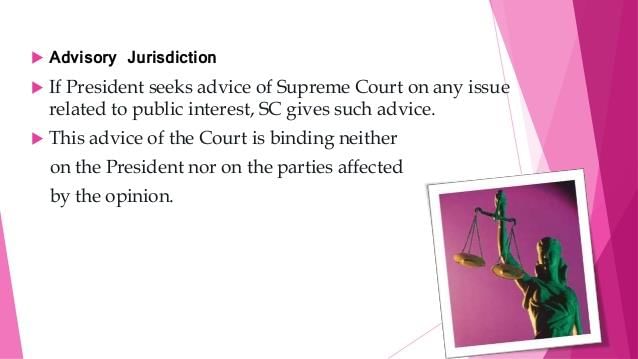
The Supreme Court of India possesses advisory jurisdiction over legal questions referred to it by the President. This advisory role is exercised under specific circumstances:
- Public Importance: When the President believes that a particular law is of significant public importance, he can seek the advice of the Supreme Court. It is important to note that such advice is not binding on the President or the government.
- Pre-Constitutional Disputes: Disputes arising from pre-Constitutional treaties and agreements, which are excluded from the Supreme Court's original jurisdiction, can be referred to the Court for advisory opinions.
Revisory Jurisdiction
The Supreme Court has the authority to review its own judgments to correct any erroneous decisions. This power is crucial because the Supreme Court acts as a court of record, and its decisions may serve as precedents for other courts in their judgments.
Judicial Review
The Supreme Court, being the highest judicial authority in India, possesses the power of judicial review. This means it can examine any law passed by the government and declare it null and void if it violates the Constitution. The Court has the authority to review all national and state laws, as well as executive orders, ensuring they align with the Constitution's principles.
Judicial review is a crucial power of the Supreme Court for several reasons:
- Dispute Resolution: In India's federal system, disputes between the state and central governments may arise. The Supreme Court has the authority to settle these disputes, maintaining the balance of power.
- Legal Interpretation: Laws in the Constitution can sometimes be written ambiguously, leading to questions about their interpretation. The Supreme Court has the power to resolve these interpretative disputes, providing clarity and guidance.
- Expertise in Law: There may be instances where the Supreme Court lacks the necessary wisdom or experience to explain certain laws. However, the Court is capable of handling such matters effectively, ensuring justice is served.
Court of Record
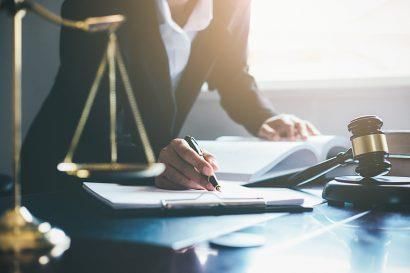
The Supreme Court serves as a court of record, meaning its decisions are officially recorded and can be used as evidence in future cases.
- Preservation of Judgments: The judgments issued by the Supreme Court are preserved and can be produced as evidence in any court.
- Contempt of Court: If a person disrespects the court's decision and dignity, they can be punished for contempt of court.
Administrative and Supervisory Functions of the Supreme Court
Appointments and Rules:
- The Chief Justice of India and other judges are responsible for appointing officers and staff of the Supreme Court.
- The Supreme Court establishes rules regarding the conduct of advocates and other individuals appearing before it.
- The procedures for public interest litigation (PIL) have been simplified by the Supreme Court.
Transfer of High Court Judges:
- The Chief Justice of the Supreme Court can recommend the transfer of any High Court judge.
- However, such a recommendation is not binding on the government if it is made without consulting the four senior-most judges of the Supreme Court.
Functions of the Supreme Court
- Original Jurisdiction: The Supreme Court has the authority to settle disputes between the central government and state governments. It also has original jurisdiction over cases involving the interpretation of the Constitution and the enforcement of fundamental rights.
- Appellate Jurisdiction: The Supreme Court can hear appeals regarding cases under its original jurisdiction. Additionally, cases pending in High Courts or lower courts can be brought before the Supreme Court if they involve constitutional interpretation in civil and criminal matters.
- Leave to Appeal: The Supreme Court has the power to grant leave to appeal against judgments of any court in India. This power is exercised in civil cases when public interest is at stake and in criminal cases when there is a serious miscarriage of justice.
- Enforcement of Fundamental Rights: Citizens whose fundamental rights have been violated can approach the Supreme Court directly. The Court can issue writs such as habeas corpus, mandamus, and quo warranto to enforce these rights.
- Nullification of Laws: The Supreme Court can declare any law made by the government null and void if it violates the fundamental rights of individuals.
- Guardian of the Constitution: The Supreme Court of India is the protector of the Constitution and democratic principles.
|
28 videos|176 docs|28 tests
|
FAQs on Revision Notes: The Supreme Court - History and Civics Class 10 ICSE
| 1. What is the role of the Supreme Court in India? |  |
| 2. What are the different types of jurisdiction exercised by the Supreme Court? |  |
| 3. How does the Supreme Court protect fundamental rights? |  |
| 4. What are the powers of the Supreme Court related to judicial review? |  |
| 5. Can the Supreme Court hear cases involving disputes between states? |  |



















